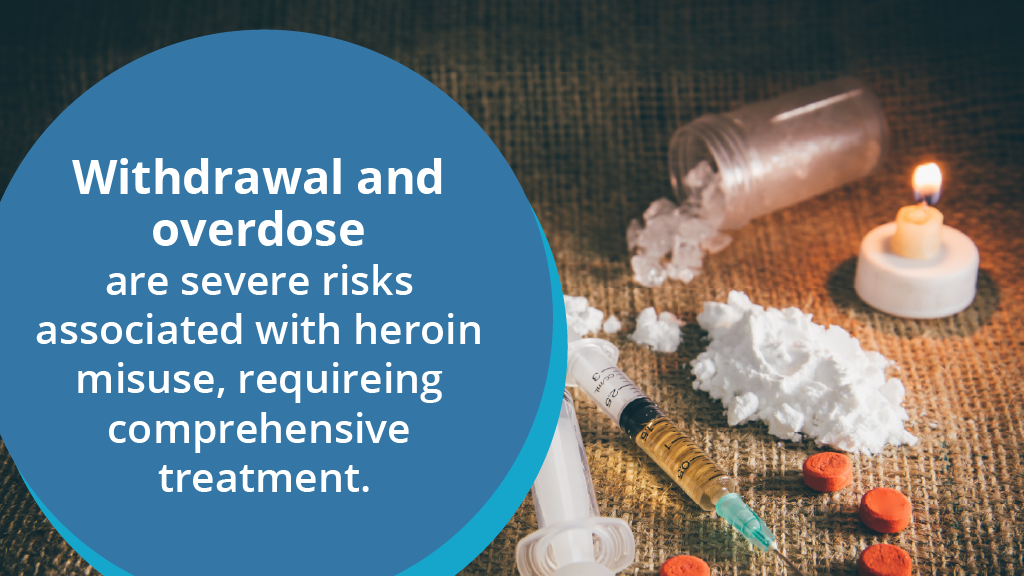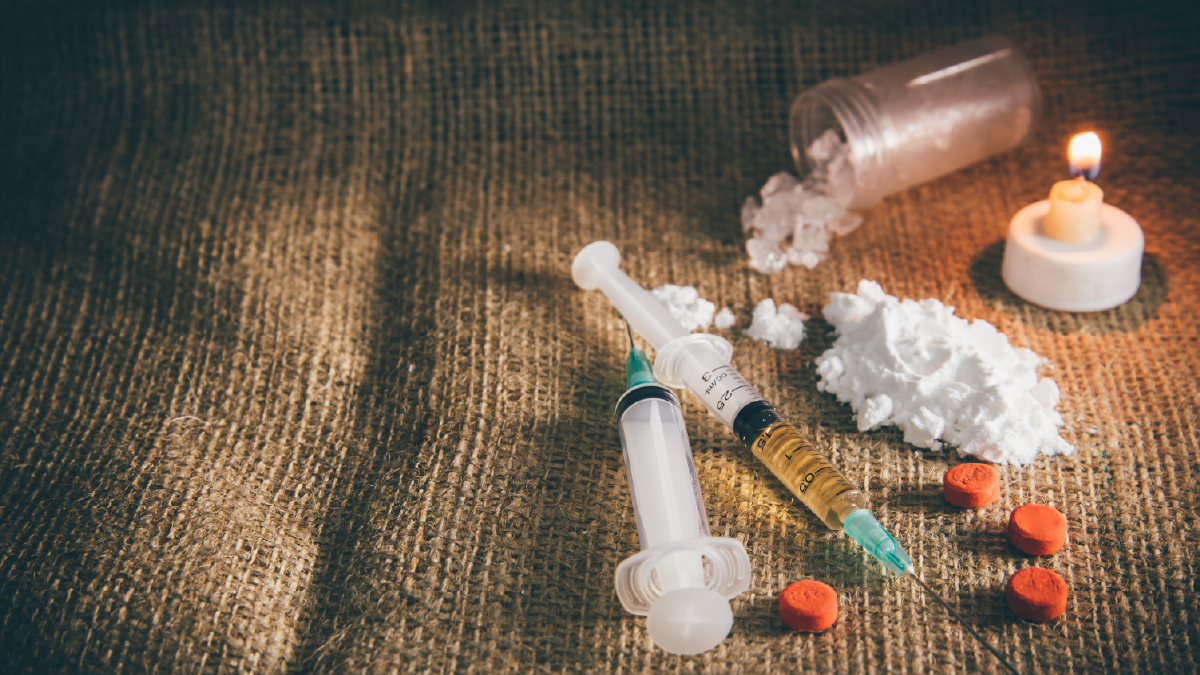Heroin, a powerful opioid, is a highly addictive drug derived from morphine, a natural substance extracted from the opium poppy plant. It typically appears as a white or brown powder or as a black sticky substance known as “black tar heroin.”
Individuals often misuse heroin by injecting, snorting, or smoking it, seeking rapid euphoric effects. Despite its illegal status and severe health risks, heroin continues to be a significant public health concern in the United States.
Heroin use can result in both short-term and long-term effects, impacting physical and mental health. This article will delve into these effects, shedding light on the risks associated with its use and the importance of prevention and treatment.
Key Takeaways
Heroin, an illegal opioid drug, is synthesized from morphine, leading to various health risks. Here is what you need to know:
- Heroin use can inflict both immediate and lasting harm on physical, psychological, and social well-being.
- Withdrawal and overdose are severe risks associated with heroin misuse, requiring comprehensive treatment.
- Various effective heroin addiction treatment options are available, such as inpatient and outpatient rehab.
Begin your journey to recovery from drug use disorder with The Haven Detox-New England. Contact us at (844) 933-4145 for personalized support.

Short-Term Effects of Heroin Use
Heroin use can have immediate and profound impacts on both physical well-being and emotional stability, causing a range of short-term health effects. Let’s explore these:
Physical Consequences
The physical toll of heroin use is swift and severe. One of the most immediate effects is a euphoric “rush” accompanied by a warm flushing of the skin, heaviness in the limbs, and clouded mental function. However, these pleasurable sensations are swiftly followed by adverse physical reactions.
Heroin depresses respiratory function, leading to slowed breathing and a decreased heart rate. Individuals may experience nausea, vomiting, and severe itching. The risk of overdose is particularly high, as excessive heroin intake can lead to respiratory failure, a potentially fatal outcome.
Emotional and Psychological Effects
Heroin doesn’t only affect the body; it also has a profound impact on a person’s emotional and psychological state. The drug affects the brain’s reward system, causing intense pleasure and relaxation. However, this is short-lived, and individuals often experience a rapid shift to a state of sedation and mental fog.
Emotional well-being becomes compromised, with individuals reporting feelings of apathy, disorientation, and detachment from reality. Anxiety and mood swings are common, contributing to the cyclical pattern of use as individuals seek to alleviate the negative emotions that accompany the drug’s come-down.
Long-Term Effects of Heroin Use
Long-term use of heroin can have severe and lasting effects on both physical and mental health. Here are some long-term effects of heroin abuse:
Physical Health
The physical effects of chronic heroin use are extensive and often irreversible. One of the most concerning effects is the damage to the cardiovascular system. Heroin abuse can lead to collapsed veins, as individuals frequently resort to injecting the drug. This not only increases the risk of infection but also heightens the chances of cardiovascular complications, including endocarditis and thrombosis.
In addition, regular heroin use wreaks havoc on the respiratory system. The act of smoking or inhaling heroin vapor can result in chronic bronchitis and other respiratory issues. The immune system suffers as well, making people more susceptible to infections. Liver and kidney damage are common, further exacerbating the toll on physical health.
Psychological Health
Heroin’s impact on mental health is profound, casting a long and dark shadow over the individual’s psychological well-being. Regular heroin use often leads to severe cases of depression and anxiety.
The drug hijacks the brain’s reward system, making it difficult for individuals to experience pleasure without the substance. This leads to an increased risk of developing tolerance, where higher doses are needed to achieve the desired effect, and ultimately results in dependence and addiction.
Moreover, heroin use is associated with cognitive impairment. Memory loss, diminished decision-making abilities, and impaired judgment become hallmarks of long-term use. The risk of mental disorders such as schizophrenia is also elevated, creating a complex interplay between the drug and the individual’s mental health.
Social Health
The social consequences of heroin use reverberate far beyond the individual, disrupting relationships, employment, and societal integration.
Employment instability is a common fallout as individuals struggle to maintain consistent work due to the demands of heroin addiction. The erosion of relationships is inevitable, as heroin use often leads to deceit, betrayal, and strained connections with family members and friends.
Furthermore, the risk of criminal involvement rises, as individuals may resort to illegal activities to sustain their addiction. The societal stigma associated with heroin use further isolates individuals, exacerbating their struggles and hindering their ability to seek professional help.
Heroin Withdrawal and Overdose
Heroin withdrawal and overdose are serious concerns that can impact individuals who use this highly addictive drug. It’s essential to identify the signs and take appropriate action promptly.
Heroin Withdrawal
When someone who regularly uses heroin decides to stop, they may face withdrawal symptoms. Withdrawal happens because the body has become dependent on the drug. This can lead to a range of uncomfortable and distressing experiences. Symptoms can include:
- Nausea and vomiting
- Muscle pain and cramping
- Sweating
- Anxiety and irritability
- Insomnia
- Dilated pupils
- Runny nose and teary eyes
The withdrawal process typically begins within a few hours of the last heroin use. It peaks within 1-2 days and gradually improves over a week. It’s a challenging time, but it’s important to remember that withdrawal is a temporary phase, and seeking support from medical professionals is crucial.
Overdose: A Life-Threatening Situation
Heroin overdose is a serious and life-threatening situation that requires immediate attention. An overdose occurs when someone takes too much heroin, leading to the body being overwhelmed by the drug. Signs of overdose may include:
- Shallow or stopped breathing
- Bluish or ashen skin
- Unresponsiveness or loss of consciousness
- Weak pulse or no pulse
- Pinpoint pupils
Call 911 immediately. While waiting for help, administer naloxone if available – this medication can reverse the effects of an opioid overdose. Stay with the person and provide basic life support, such as CPR (if needed), until professional help arrives.
Treatments for Heroin Addiction
Treating any substance use disorder (SUD) typically involves a comprehensive approach that addresses both the physical and psychological aspects of dependence. Here are some common treatments for heroin addiction:
Medical Detoxification
Medical detox, often the initial step in treatment, involves supervised withdrawal in a medical setting. Healthcare professionals manage withdrawal symptoms, ensuring the process is as safe and comfortable as possible. Medications may be administered to alleviate symptoms, making the transition to a drug-free state more manageable.
Rehabilitation Programs
Rehab programs offer structured environments for individuals to address the root causes of addiction. Inpatient treatment programs provide 24/7 care within a residential setting, allowing for intense focus on recovery. Outpatient treatment programs offer flexibility, allowing individuals to attend treatment sessions while maintaining daily responsibilities. Both options often include counseling, therapy, and support groups.
Behavioral Therapies
Behavioral therapies, such as cognitive behavioral therapy (CBT) and contingency management (CM), target the underlying thought patterns and behaviors associated with heroin use. These therapies help individuals identify and change destructive habits, develop coping mechanisms, and build resilience against triggers that may lead to relapse.
Medication-Assisted Treatment (MAT)
Medication-assisted treatment (MAT) combines medications with counseling and behavioral therapies to address heroin addiction comprehensively. Medications like methadone, buprenorphine, and naltrexone are used to reduce cravings, prevent relapse, and support recovery. MAT has proven effective in promoting long-term abstinence and improving overall quality of life.
Support Groups
Participation in support groups, such as Narcotics Anonymous (NA) or SMART Recovery, provides individuals with a sense of community and understanding. Sharing experiences and receiving encouragement from peers who have faced similar challenges can be a powerful motivator in maintaining sobriety.
Lifestyle Changes and Holistic Approaches
Holistic approaches encompass lifestyle changes that contribute to overall well-being. These include adopting a healthier diet, exercising regularly, and incorporating stress-reducing activities like yoga or meditation. Holistic approaches recognize the interconnected nature of physical, mental, and emotional health in the recovery process.
Frequently Asked Questions (FAQ)
Can long-term heroin use lead to mental health issues?
Yes, long-term heroin use can lead to severe mental health issues. Chronic use may contribute to anxiety, depression, cognitive impairment, and emotional instability, exacerbating the overall impact on an individual’s mental well-being.
What are the physical health implications of prolonged heroin use?
Prolonged heroin use has profound physical health implications, including respiratory problems, higher risk of infectious diseases, digestive issues, malnutrition, and compromised immune function.
Does heroin harm your body?
Yes, heroin harms the body significantly. It damages the respiratory system, weakens the immune system, and contributes to digestive issues. Prolonged use leads to severe health complications, affecting various organs and overall well-being.
How can we reduce the effects of heroin withdrawal?
Reducing the effects of heroin withdrawal involves seeking professional help. Medical detoxification, medications, and supportive therapies can alleviate withdrawal symptoms, making the process more manageable.
Experience New You With The Haven Detox-New England
At The Haven Detox-New England, we understand that overcoming heroin use disorder is a challenging journey, but you don’t have to face it alone. Our dedicated team is here to support you on the path to recovery.
Kickstart your transformation with our medical detox program, expertly designed to cleanse your body from harmful toxins under professional supervision. Experience our inpatient rehab, providing intensive 24/7 care.
Our medical experts excel in medication management, evidence-based therapies, and holistic approaches, ensuring a comprehensive and personalized recovery journey. Also, If you’re also grappling with mental health problems alongside drug addiction, our dual diagnosis program is tailored to address both aspects simultaneously.
It is time to take the first step towards a healthier future. Contact us today at (844) 933-4145 for more information.




